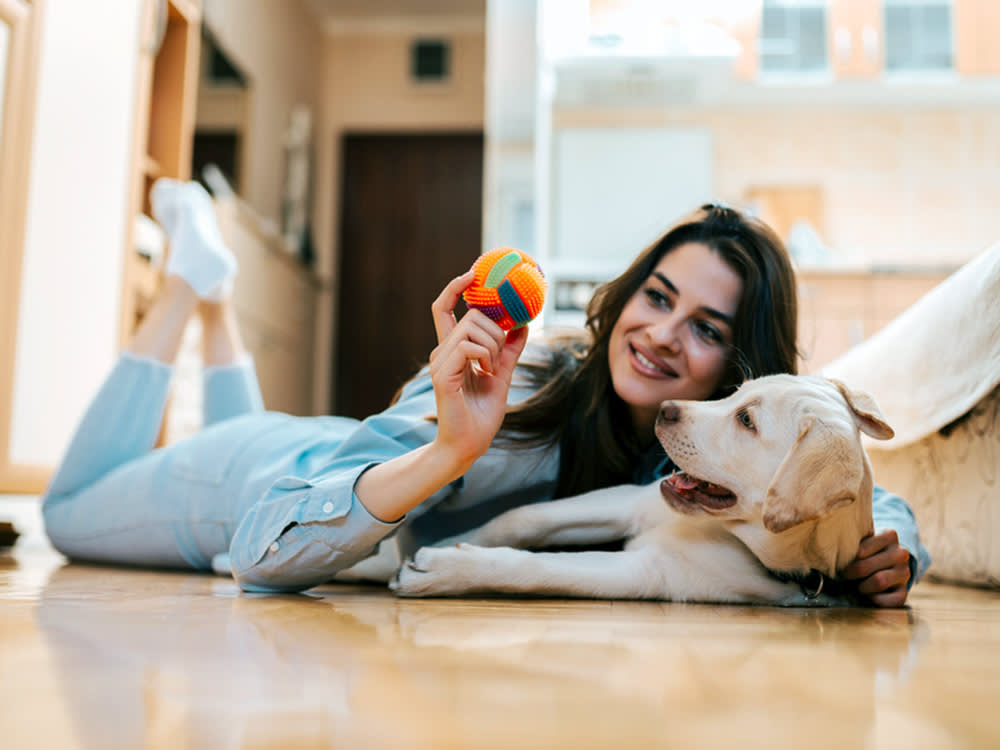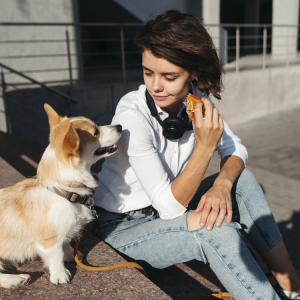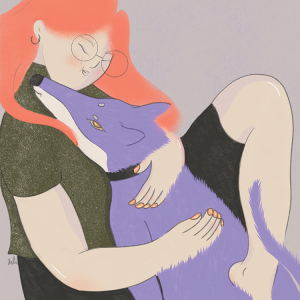Your Dog Actually Knows the Words for Familiar Objects, Study Finds
Time for a “Proud Parent of a Canine Honors Student” bumper sticker.

share article

Your pet wants you to read our newsletter. (Then give them a treat.)
It’s a common scene for dog parents. You’re going about the day when your pup runs up to you with their signature joyful bounce. Clearly, this is an invitation for attention, so you respond with an enthusiastic “Go get your ball!” Seconds later, they return and drop it in front of you.
Naturally, you take this event as further evidence that your pup is wise beyond their years and species. Actually, maybe it’s more than that. You then consider the idea that your dog might be a genius who represents the next stage in canine evolution and is mere years from speaking English fluently.
The truth is… somewhere in the middle. They very well may understand the word “ball” perfectly but, somewhat unfortunately, that’s not unusual for dogs. New research confirms as much but adds that their vocabulary could be even more vast than we previously believed. Led by a team at Eötvös Loránd University in Hungary, a studyopens in a new tab published last week in Current Biology found that dogs can fully understand the words for several objects.
Your dog actually knows the meaning of that word.
“Dogs do not only react with a learned behavior to certain words,” Marianna Boros, an ethologist at Eötvös Loránd University and lead author on the study, said in a statementopens in a new tab. “They also don’t just associate that word with an object based on temporal contiguity without really understanding the meaning of those words, but they activate a memory of an object when they hear its name.”
Any trainer could tell you that dogs can be taught certain cues after repetition, but Boros and her team wanted to investigate whether the animal understands terms outside of reward or cadence. For this, the researchers examined the brain activity of 18 dogs by connecting them to an electroencephalogram machine. If you’re like me and struggled past the first two syllables of “electroencephalogram,” just imagine a far less invasive version of the Coke can test on Eleven in Stranger Things. It was basically that.
Pet parents were instructed to bring objects familiar to their dogs, with most choosing toys like balls, Frisbees, or tug ropesopens in a new tab. However, some also brought along other recognizable household items, including leashes, collars, bowls, slippers, and even phones. They’d then present the objects one at a time to their pups while researchers tracked their brain activity.
To determine the dog’s cognitive understanding of each item, pet parents would alternate between correctly and incorrectly identifying aloud what they were holding to their pet. For example, they’d show the animal a Frisbee and say “Frisbee” before then presenting a leash and saying “collar.”
When dogs had to identify the mislabeled item, there was often an uptick in their brain activity because they had to do additional processing to think of the right word. The researchers took this as a sign that the pets had made a cognitive connection between the object and the word, implying that they create mental representations of objects in their minds. The team originally assumed this ability was solely linked to animals with large vocabularies, but their tests proved otherwise.
“In our study, some dogs were familiar only with a few object names, while other dogs knew quite many object names according to their owners. However, we did not find a relationship between the number of object words dogs knew and the size of the mismatch response,” Boros says.
According to the study, this type of experiment has also been performed on humans to determine cognitive understanding to a similar effect. “This suggests that the capacity to understand words in a referential way is generally present in dogs as a species and not just in dogs who have experience with a large number of object words,” Boros adds.
Your dog knows what you’re saying — even if they pretend they don’t.
The findings ultimately concluded that 14 out of the 18 dogs displayed brain activity that indicated they understood the words. A variety of breeds were involved, including Border Collies, Poodles, Miniature Pinschers, Labrador Retrievers, and mixed-breed dogs, among others. They were also of varying ages falling anywhere between one and 10 years.
“Based on our study we believe that if a dog understands the meaning of an object word, it will understand it in a referential way, no matter how many words it understands,” Boros explains before offering some sage advice. “Therefore, we would encourage owners who see that their pup is particularly enjoying playing with objects to name those objects frequently.”
The research team noted that their findings also suggest that contrary to cues, dogs may understand the word you’re saying to them but not fully grasp the task you’re asking. So, if you say, “Go get your ball” they might recognize you’re talking about their ball but not understand what you’re asking them to do with it. “Even if the dog is at random when playing fetch, it might still understand the meaning but can get distracted by different object features,” Boros adds.
In another scenario that I find a bit too familiar, the team added that dogs may understand you’re saying “ball” and are simply choosing to ignore you about it. Unfortunately, we very well could be to blame for that attitude. As Boros puts it, “Dogs have been selected for over 5000 generations to cooperate and communicate with humans. It is therefore possible that their domestication process played a role in the emergence of their capacity to understand object words.”
So, the next time you’re trying to get your dog to bring you the “alien toy” from their basket, for example, and they stare at you blankly, don’t let them fool you. They could very well understand what you’re saying and are simply choosing to ignore you — like the beautiful genius they are.
References:
Neural Evidence for Referential Understanding of Object Words in Dogsopens in a new tab

Sean Zucker
Sean Zucker is a writer whose work has been featured in Points In Case, The Daily Drunk, Posty, and WellWell. He has an adopted Pit Bull named Banshee whose work has been featured on the kitchen floor and whose behavioral issues rival his own.
Related articles
![corgi giving woman puppy dog eyes begging for food]() opens in a new tab
opens in a new tabYou Have Evolution to Thank For Your Dog’s Manipulatively Adorable Look
Researchers call it the “puppy-dog eye effect” — and oh, boy is it effective.
![Man hugging his fluffy white dog happily]() opens in a new tab
opens in a new tabChemistry Between People and Dogs Is Real (It’s Science)
How the “love hormone” oxytocin connects us with our pups.
![Couple hugs their merle Boxer]() opens in a new tab
opens in a new tabYour Relationship With Your Dog Matters. Here’s How You Can Improve It
Animal behaviorist Dr. Karen B. London on how to strengthen your pet-parent bond.
![Illustration of a woman hugging a dog]() opens in a new tab
opens in a new tabIs That...Stress Your Dog Smells?
A 2022 study finds that your pup can tell — er, smell — when you’ve been doom-scrolling.
![]() opens in a new tab
opens in a new tabTo Cry Is Human — and Apparently Canine
Time to whip out The Notebook for a little doggy movie night.
![Australian shephard and Corgi mix play fighting outside]() opens in a new tab
opens in a new tabTurns Out Humans Kind of Suck at Recognizing the Signs of Dog Aggression
A PSA to pay better attention to our best friends’ body language.









